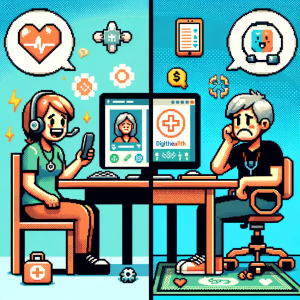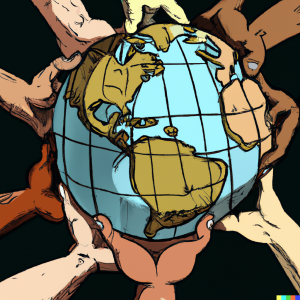
Digital Health Equity: Bridging the Divide in Our Modern Healthcare
In today’s fast-paced era, where technology seems to offer solutions for almost everything, a critical area still lags: digital health equity. Despite the surge in digital health tools – think fitness trackers, telemedicine, and health apps – not everyone is benefiting equally. This gap in digital health equity could mean missing out on life-saving innovations for some. Let’s unpack a fascinating scientific article that sheds light on this critical issue and explores how we can close the digital health divide.
The Digital Health Equity Framework
Imagine two people: one with easy access to the internet, health apps, and telemedicine; the other without such luxuries. The difference in their healthcare experiences is stark. This scenario underlines the importance of digital health equity – ensuring that everyone, regardless of their background, has equal access to digital health tools.
The Layers of Influence
- Policy and Structural Determinants: Think of the internet like a highway. If it’s not reaching every neighborhood, some folks can’t travel the health information superhighway.
- Systems-Level Determinants: Health systems must invest in digital tools, but this often varies. Without resources, how can they support digital innovation, especially in marginalized communities?
- Community/Social-Level Determinants: Communities and social connections significantly influence health behaviors and access to digital health.
- Individual-Level Determinants: This is about a person’s ability to use digital tools – their digital literacy. It’s also about seeing these tools as useful and trusting in them.
- Digital Health Intervention-Level Determinants: The tools themselves must be accessible, easy to use, and understandable for everyone.
Strategies for Advancing Digital Health Equity
Co-Designing With Communities
It’s not just about building an app and expecting it to work for everyone. Digital health tools need to be created with input from the communities they aim to serve. This approach ensures relevance and cultural appropriateness.
Building Digital Literacy
Teaching people how to use these tools is as important as the tools themselves. Tailored training programs can make a huge difference.
Leveraging Social Relationships
Incorporating social support – from family, friends, and community organizations – can significantly enhance the effectiveness and uptake of digital health programs.
Integrating Digital Tools in Healthcare Systems
This means ensuring digital health initiatives align with the workflow and capacity of health systems, particularly those serving marginalized populations.
Addressing Structural Barriers
Access to high-speed internet and digital devices is fundamental. Without these, digital health remains a distant dream for many.
Looking Ahead: Recommendations for a Digitally Equitable Future
The path to digital health equity requires multi-layered efforts. It’s about breaking down silos between disciplines, engaging deeply with communities, and implementing real-world, practical solutions. It’s about measuring and understanding digital access and ensuring these tools reach those who need them the most.
Final Thoughts
In the digital era, let’s not leave anyone behind in accessing health resources. It’s time to leverage technology not just for the sake of innovation, but for equity and better health for all.
What are your thoughts on digital health equity? How can we ensure that digital health tools benefit everyone, not just a select few? Share your ideas in the comments below!
Empower Your Public Health Journey – Subscribe and Transform!
Unlock the transformative power of knowledge with ‘This Week in Public Health.’ Each issue is a treasure trove of insights into crucial research, community health achievements, and advocacy strategies. Don’t just read about change – be the agent of it. Subscribe for free and start making an impact with each edition!
About The Author
Jon Scaccia, with a Ph.D. in clinical-community psychology and a research fellowship at the US Department of Health and Human Services, is renowned for his expertise in public health systems and quality programs. He specializes in implementing innovative, data-informed strategies to enhance community health and development. Jon’s significant contribution to public health is underscored by his creation of the R=MC² readiness model, which aids organizations in effectively navigating change.



